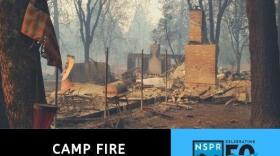As you walk up to Patti and James Stephens’ fifth wheel, you can see they’re working to make it feel like a home.
It now has a ramp for Patti and the walker she uses that leads up to the door, there are a couple of photos sitting on a shelf inside and a potholder hangs on the wall that says “Live the life you love.” It’s a saying Patti says they believe in. But right now you could probably take off those last four words — “live” is good enough.
It was a month ago when Patti was sent to the hospital because blood started collecting outside of her brain. Her husband, James, often called Jimi, said ever since the subdural hematoma, they’ve viewed life differently.
“We had, like I said, a nice, warm, safe place, and now we’re living in a trailer and moving again,” Jimi said. “It’s good to be alive every day, that’s our struggle.”
Today Patti is sitting in her trailer wrapped in a green, red and white plaid blanket. The beanie she’s wearing covers a long braid on one half of her head. The other half is shaved and scarred from a recent surgery. Before I arrived at her place, Patti sent me a text that read: “Bring a coat, I don’t have any heat.” While I sit next to her I ask her what she wants people to know about her story.
“That Concow exists,” she replied.


It’s been almost a year since the Camp Fire devastated their tiny, rural hometown of Concow. Set on a mountain, the community is located about 10 miles as the crow flies from Paradise, but was only a few miles from where the blaze first ignited. Concow was the first community in the area to be inundated with flames the morning of November 8, 2018. Many of its residents had minutes to leave their homes. Now most tell me they feel forgotten. In 2010, Concow had a little more than 700 residents according to data from the U.S. Census Bureau. Now, few homes remain and those who are left are mostly scattered across the hilly terrain in any type of shelter available — trailers, sheds, yurts, tents, cars.
At first glance, Patti, who is 68, and Jimi, who is almost 67, seem like they’re doing better than when I last saw them three months ago. They’ve upgraded their trailer. They’re about to move onto a property with their grandkids. But once we start talking, I can see their recovery is like so many others in the region: it’s a dance where you go one step forward, two steps — sometimes three steps — back.
The trailer is bigger, but the heater is broken. It has a shower, but the septic holding tank is cracked and leaking. They have a generator, but Jimi said paying for gas to fuel it is eating into their wallets.
“We were talking about $50 a week for extra gas. You got 40 bucks for propane,” he said. “We’re on a fixed income —all that extra expense is just not easy for all of us.”

With Social Security as their main source of income, more gas for the generator means less gas for the truck. But no running water and a small refrigerator in the trailer also mean they need to make more trips to the store.They say they do what they can to conserve. Every trip is planned and coordinated. They recently switched to the same doctor and now make their appointments for the same time. Patti had a stroke almost three years ago, and Jimi has Type 2 diabetes, an irregular heartbeat and chronic obstructive pulmonary disease (COPD). Patti said aside from tightening spending where they can, there's not much else they can do.
“We try to have enough money for gas. We kind of figure it out through the month. Otherwise we cancel the appointment,” she said.
Jimi and Patti are hoping that unlike the trailer upgrade a few months ago, the upgrade to their grandkids’ property is a realstep forward. There they’ll be near their great-grandkids, they’ll have hooked-up running water and sewer, and they’ll be close to help if they need it.





